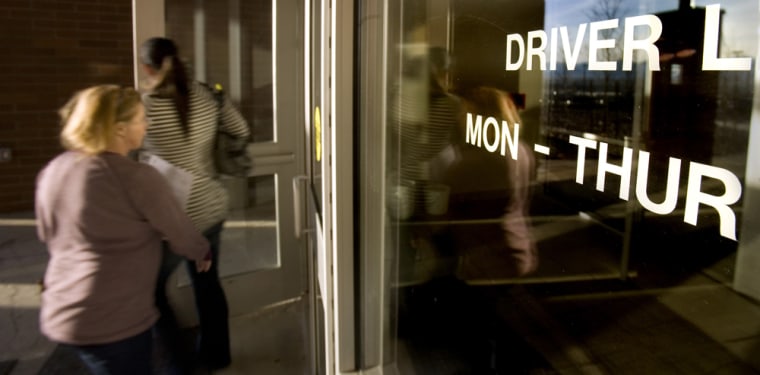Six months after Utah became the first state government in the nation to adopt a four-day workweek, the money-saving experiment is attracting interest from other states trying to ease their financial problems.
"Why? Three words: Massive. Budget. Deficit," said New York state Rep. Michael Gianaris, a Democrat who estimates his state would save $30 million by switching to a four-day week.
Because of New York's $15 billion budget shortfall, "there are a lot of painful decisions that have been put before us," Gianaris said.
Utah switched to a four-day week last year primarily to save money on electricity, gasoline and other energy expenses. The change affected 17,000 state employees, who now work 10 hours a day, four days a week.
These days, employees have embraced the long weekends, and the public has grown accustomed to state agencies being closed on Fridays.
An interim report released earlier this month by Gov. Jon Huntsman shows that the initiative will cut greenhouse gas emissions by more than 12,000 metric tons, reduce gasoline consumption among commuting employees by 744,000 gallons annually and pump as much as $3 million into the economy from workers who have to spend less money on gas.
The state is also saving more than $200,000 on janitorial contracts.
Others taking note
Hawaii tried a limited four-day week this fall, and a similar program is under way in Washington state. Lawmakers in West Virginia and Virginia are studying whether a four-day workweek would make sense for them.
"Most states had an alternative work schedule for their employees, but I think Utah's effort really caused them to pull those policies out, dust them off and encourage managers and supervisors to allow their employees to do it," said Leslie Scott, director of the National Association of State Personnel Executives based in Lexington, Ky.
A hiring freeze and budget cuts have made it difficult to tell if Utah's shorter workweek will attract new job applicants. But many existing employees have found the schedule offers more flexibility.
"I don't have kids, so it doesn't complicate my personal life. It actually frees up my weekend, and I like that more," said Danielle Downey, a compliance specialist for the state's insect programs. "This way I've got that extra day to do things at home and then I have two recreation days."
At the same time, complaints about closed offices have dropped, and wait times at the Division of Motor Vehicles are actually decreasing because the agency now has extended hours Monday through Thursday.
But state officials expect to fall short of their goal of saving $3 million on energy because of unpredictable prices, an overestimation of how many buildings they could close and because some employees fail to shut off computers or copy machines.
Initially, Huntsman's staff set a target of closing 1,000 of the state's 6,000 buildings on Fridays. College campuses, courthouses, liquor stores, veterans hospitals and emergency services remain open on Fridays.
However, the state has only been able to close 900 buildings. Of those, about 500 are being leased, which reduces the energy savings.
Interest grows, skepticism continues
The governor's office says its phones are ringing off the hook with states such as New Mexico asking questions about the four-day workweek, but many lawmakers here are still skeptical.
"I always had reservations and we've not been shown yet data that would show the benefits of it," said Republican state Sen. Greg Bell.
Huntsman, who introduced the initiative with little-to-no input from state workers, residents or lawmakers, is urging patience.
The governor plans to evaluate the program's effectiveness in June or July and decide then whether to continue with the four-day schedules.
"We'll kind of do an evaluation of the underlying metrics to see what it has meant to the state in terms of energy savings, which will be different now because energy costs have gone down, but they're certain to go up again," he said.
In Washington state, about 700 employees are working a four-day workweek as part of a six-month pilot program.
"There does seem to be a pretty good satisfaction rate among employees and customers," said Glenn Kuper, spokesman for Washington's Office of Financial Management. He cited energy savings in at least one agency and evidence that employees are using less sick leave because they have an extra day off.
Kuper's observations mirror those of officials in Utah, where overtime and absenteeism have been cut by about 9 percent since the four-day workweek was adopted.
